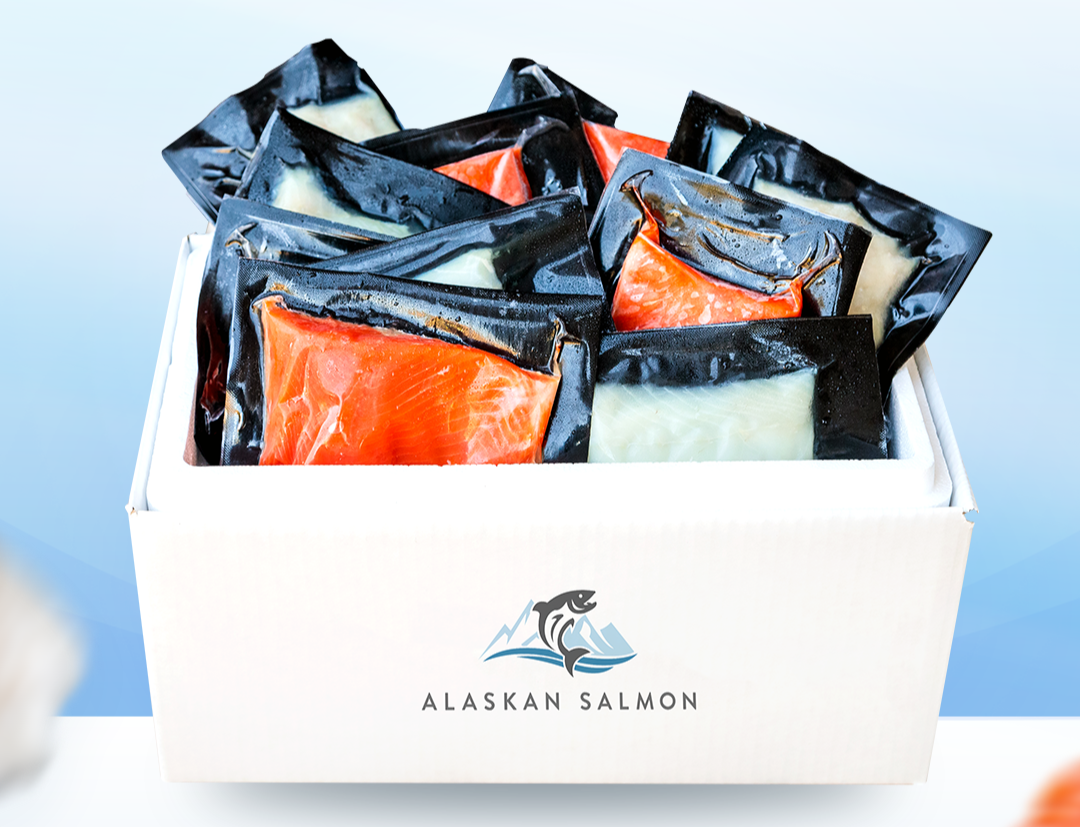How Long Can Salmon Stay in the Fridge Before It Goes Bad?
Updated on Nov 18, 2021
Salmon is a tasty, healthy fish that many people enjoy. However, because it’s a fresh food, it can spoil quickly if not stored properly. When you buy salmon, you might wonder, “How long can I keep it in the fridge before it goes bad?”
The answer depends on the type of salmon and how it was stored. Some types, like raw salmon, only last a day or two, while smoked salmon can stay good for much longer. Knowing the right fridge times helps you avoid food waste and keeps you safe from getting sick.
Let’s look at how long different types of salmon last in the fridge and how to tell if they’ve gone bad.
TL;DR: How Long Does Salmon Last in the Fridge
Each type of salmon has a different shelf life, so using it within the right time frame helps keep it safe and tasting its best. Here’s an easy reference for storing salmon safely in the fridge.
| Type of Salmon | Fridge Shelf Life |
| Raw salmon | 1–2 days |
| Cooked salmon | 3–4 days |
| Thawed salmon | 1–2 days |
| Vacuum-sealed salmon | Up to 5 days (unopened) |
| Smoked salmon | 1–2 weeks (unopened); up to 5 days once opened |
How Long Does Raw Salmon Last in the Fridge?
Raw salmon typically lasts 1 to 2 days in the fridge because it is highly perishable. Fish has a high moisture content and delicate proteins, which make it a perfect environment for bacteria to grow.
Once salmon is harvested, natural enzymes begin to break down the flesh, and bacteria on the surface can slowly multiply in the fridge. While refrigeration slows this process, it does not stop it completely.
That’s why fresh salmon should be cooked soon after purchase, especially if it comes from a seafood counter where it may have already been handled or stored for some time.
Tips for storing raw salmon in the fridge
To keep raw salmon as fresh and safe as possible during its short fridge life, proper storage is key. A few simple steps can help maintain quality.
- Store raw salmon in its original packaging or transfer it to an airtight container to limit exposure to air and bacteria.
- Place the salmon on a plate or in a shallow dish to catch any juices and prevent cross-contamination.
- Keep salmon in the coldest part of the fridge, usually the back or bottom shelf.
- Avoid rinsing raw salmon before storing it, as this can spread bacteria around your sink and kitchen.
- If you don’t plan to cook the salmon within one to two days, freeze it to keep it safe and fresh longer.
These tips will protect raw salmon during its short shelf life. Following them ensures the salmon stays fresh, flavorful, and safe until you’re ready to prepare it.
How Long Does Cooked Salmon Last in the Fridge?
Cooked salmon lasts 3 to 4 days in the fridge because cooking kills most of the bacteria present on the fish at the time it’s prepared. However, cooking does not make salmon immune to spoilage.
Once the fish cools, new bacteria from the air, utensils, or hands can be introduced during handling.
Tips for storing cooked salmon in the fridge
Regardless of how the salmon was cooked (baked, grilled, or pan-seared), the same storage rules apply to keep it from spoiling too quickly.
- Let cooked salmon cool slightly, then transfer it to an airtight container before placing it in the fridge.
- Store cooked salmon within two hours of cooking to reduce the chance of bacterial growth.
- Place the container in the coldest part of the fridge, usually the back or bottom shelf.
- Keep cooked salmon away from raw foods to prevent cross-contamination.
- Label the container with the date so you can easily track how long it has been stored.
How Long Does Thawed Salmon Last in the Fridge?
Many people thaw salmon ahead of time for meal planning, busy weeknight dinners, or to make sure it’s ready to cook when they need it. Thawed salmon should be cooked and eaten within 1 to 2 days, because once it’s thawed, it’s no longer protected by freezing temperatures that slow bacterial growth.
In the fridge, harmful bacteria like Listeria or Salmonella can begin to multiply if the salmon sits too long. Eating it within this short window helps reduce the risk of foodborne illness and keeps the salmon tasting fresh. This is especially important if you thaw salmon to save time.
Tips for storing thawed salmon in the fridge
Thawed salmon needs extra attention because it has already been exposed to warmer temperatures during thawing. These tips help keep it safe and tasty until you cook it.
- Thaw salmon in the fridge, not on the counter, to keep it at a safe temperature while it defrosts.
- Store thawed salmon on the bottom shelf to prevent any drips from contaminating other foods.
- Keep thawed salmon wrapped tightly or in a sealed container to prevent it from drying out or absorbing other fridge odors.
- Cook thawed salmon within 1 to 2 days for the best flavor and safety.
How Long Does Vacuum-Sealed Salmon Last in the Fridge?
Vacuum-sealed raw salmon can last up to 5 days in the fridge because the vacuum sealing process removes most of the oxygen around the fish.
Without oxygen, bacteria that cause spoilage have a harder time growing, so the salmon stays fresher for longer. This is why vacuum-sealed salmon is often sold in grocery stores with a longer “use by” date than unpackaged fish.
Tips for storing vacuum-sealed salmon in the fridge
Vacuum-sealed salmon can last longer, but you still want to store it correctly to keep it fresh. Follow these tips.
- Always check the seal before storing vacuum-sealed salmon.
- If the package is bloated or leaking, discard it.
- Store salmon at 32°F–38°F (0°C–3°C) for the safest temperature range.
- Keep it on the bottom shelf to reduce the risk of cross-contamination.
- Use it before the “use by” date even if it appears fine.
How Long Does Smoked Salmon Last in the Fridge?
Smoked salmon can last 1 to 2 weeks if unopened, and up to 5 days once opened. The reason it lasts longer than fresh salmon is because the smoking and curing process helps preserve the fish. Smoking removes moisture and adds salt, which makes it harder for bacteria to grow.
However, once the package is opened, the protective environment is broken, and the salmon is exposed to air and new bacteria. That’s why it should be eaten within a few days after opening.
Tips for storing smoked salmon in the fridge
Smoked salmon is a popular choice for sandwiches, salads, and quick meals because it stays fresh longer and doesn’t require cooking. Still, it’s important to keep it refrigerated. Here are some tips to help prevent spoilage.
- Keep the package sealed until you’re ready to use it.
- Store smoked salmon on the bottom shelf to prevent cross-contamination.
- Wrap leftover smoked salmon tightly to prevent drying out.
- Label the container with the date you opened it.
- Eat opened smoked salmon within a few days for the best taste and texture.
How to Tell If Salmon is Bad
Spotting spoiled salmon early can prevent foodborne illness. These are the most common warning signs:
-
Smell: Fresh salmon smells mild and slightly ocean-like. If it smells sour, overly fishy, or like ammonia, toss it.
-
Appearance: The flesh should be bright pink or orange and moist. Avoid salmon that looks dull, grayish, dry, or has mold or discoloration.
- Texture: Fresh salmon should feel firm and spring back when pressed. If it feels slimy, sticky, or mushy, it’s likely spoiled.
When in doubt, it’s safer to throw salmon away than risk getting sick.
Important Points to Remember When Storing Salmon in the Fridge
The most important thing to keep in mind is which type you’re storing and how quickly it needs to be used. Here’s a quick recap of the key storage rules from the sections above:
- Raw salmon should be cooked within 1–2 days, since it spoils quickly even when refrigerated.
- Cooked salmon stays good for 3–4 days, but it should be cooled and stored in an airtight container soon after cooking.
- Thawed salmon should be used within 1–2 days, and it should always be thawed in the fridge, not on the counter.
- Vacuum-sealed salmon can last up to 5 days, but only if the seal stays intact and it’s kept consistently cold.
- Smoked salmon lasts the longest when unopened, but should be eaten within 5 days once opened.
- Always trust your senses. If the salmon smells sour, looks dull, or feels slimy, it’s safer to throw it away.
Summary
Salmon is a tasty, healthy choice for many meals, but it can spoil quickly if it’s not stored the right way. Get the most out of this heart-healthy fish without risking your health by following the right storage rules for each type of salmon.
Looking for high-quality salmon you can trust? Try our Wild Alaskan Sockeye Salmon or Wild Alaskan King Salmon, flash-frozen at peak freshness. It’s the perfect way to keep premium salmon on hand.








